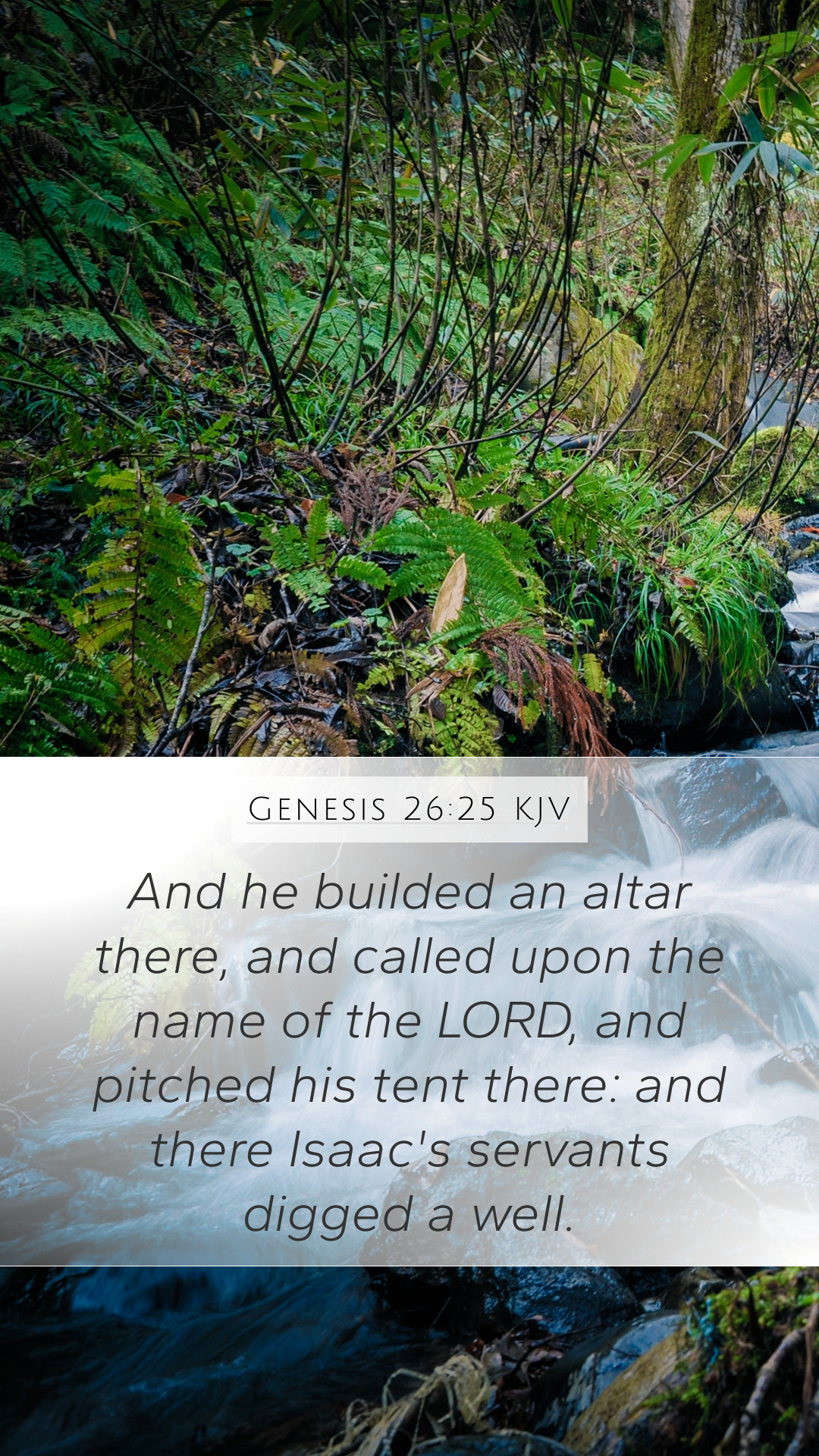Understanding Genesis 26:25
Genesis 26:25 states: "So he built an altar there and called upon the name of the Lord and pitched his tent there. And there Isaac's servants dug a well."
This verse encapsulates significant themes of worship, obedience, and God's provision. Let's delve into a comprehensive exploration of its meaning through the lens of public domain commentaries.
Textual Insights
The verse reveals a pivotal moment in Isaac's life as he responds to God's presence and direction. Here are some key components to understand:
- Building an Altar: Isaac's act of constructing an altar signifies his dedication and recognition of God's sovereignty. It illustrates the importance of setting apart spaces for worship, which is a common theme seen with other patriarchs as well.
- Calling Upon the Name of the Lord: This phrase implies that Isaac sought communion with God through prayer and supplication. It highlights a personal relationship with God, a reminder that faithful worship involves seeking His guidance and assistance.
- Pitched His Tent: In the context of nomadic life, pitching a tent signifies stability and residence in a location God has chosen. It reflects Isaac’s willingness to remain in God’s promised land, symbolizing faith and trust in God’s plan.
- Dug a Well: The act of digging for water indicates the necessity for sustenance and God’s provision in the wilderness. Wells often signify abundance and the nourishment needed for life.
Bible Verse Meanings and Interpretations
According to Matthew Henry, this passage showcases Isaac's faith in God during challenging times. It illustrates how he honors God amidst adversity and thus finds favor and sustenance.
Albert Barnes highlights the spiritual significance of both worship and work in Isaac's actions. Building an altar points to devotion while digging wells signifies the need for physical sustenance.
Adam Clarke emphasizes the broader implications this has for understanding God’s provision. He suggests that God never forsakes those who commit themselves to Him in faith and worship.
Historical Context
Genesis 26 is set against the backdrop of a land that faces drought and famine, which adds to the gravity of Isaac’s actions. His faith leads him to remain where God instructed, and thus he experiences His blessings.
Application to Daily Life
This verse serves as a reminder of the importance of establishing a relationship with God through worship, whilst also participating in the work He calls us to. In a world filled with uncertainty, finding time to build our “altars” and “dig wells” becomes crucial for spiritual and physical nourishment.
Cross References
- Genesis 12:7: Abraham’s altar-building as an act of worship.
- Exodus 20:24: Instruction on altars in worship.
- Psalm 105:4: Seeking the Lord as a vital practice.
Conclusion
Understanding Genesis 26:25 involves a balanced view of worship and practical life. As we engage in Bible verse commentary, we find that our relationship with God encompasses both our spiritual pursuits and our daily needs. By reflecting on Isaac’s actions, we gain insights into how to apply these principles in our own lives—making this verse a rich resource for Bible study groups, individuals seeking understanding, and as an example for online Bible study tools.
Further Study Suggestions
For those interested in deeper interpretations and applications, consider exploring the following:
- How to interpret Bible verses: Gain skills in studying Scripture.
- Understanding difficult Bible passages: Tackle complex themes in the Bible.
- Bible study guides: Use resources to facilitate discussions and insights.


